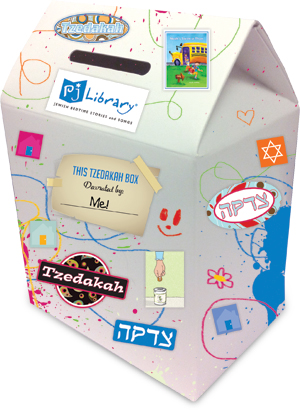 TZEDAKAH became more of a household word in November after PJ Library and the Harold Grinspoon Foundation (HGF) mailed over 70,000 cardboard tzedakah boxes to PJ recipients, ages 3 to 8. The project was designed to introduce the Jewish value of tzedakah in a fun and engaging way for children and their families.
TZEDAKAH became more of a household word in November after PJ Library and the Harold Grinspoon Foundation (HGF) mailed over 70,000 cardboard tzedakah boxes to PJ recipients, ages 3 to 8. The project was designed to introduce the Jewish value of tzedakah in a fun and engaging way for children and their families.
Along with the cardboard tzedakah box (and decorative stickers) enclosed with November’s books, PJ Library founder Harold Grinspoon also included a tear-out form and envelope.
“I would love to hear your tzedakah story,” Harold told PJ families in a letter. “Please consider sharing news about the charities or causes your family chooses to support through tzedakah money.”
Indeed, families did respond. Hundreds of children drew pictures and wrote letters to Harold, telling him of their tzedakah plans.
TZEDAKAH IN THE NEWS
PJ families weren’t the only ones to respond to HGF’s tzedakah-related mailing; the Jewish press responded, too.
The Jewish News of Greater Phoenix, for example, quotes a PJ mom who calls the tzedakah box project “a way to start the conversation [about tzedakah].” She adds, “It’s a free and awesome opportunity to provide Jewish learning through Jewish stories and culture.”
Inside the pages of the San Diego Jewish World, Isaac and Marcy Blumberg call the tzedakah box project “the opportunity to teach our children this ‘important lesson of responsibility’ that the Jewish religion stands for.”
WHAT IS TZEDAKAH?
Tzedakah (from the Hebrew word meaning righteousness, fairness, or justice) refers to the responsibility to give money and/or assistance to the poor or needy or to worthwhile causes.
Tzedakah is about making sure that all of the world’s resources (food, water, clothing, education, shelter, etc.) are shared justly.
For PJ Library founder Harold Grinspoon,
tzedakah has very personal significance. “Jews consider it an act of justice to give charity to those in need,” he says. “It is not something we do just because it feels good; we do it because our tradition obligates us to give.”
« RETURN TO THE PJ LIBRARY BLOG'S HOME
December 6, 2012